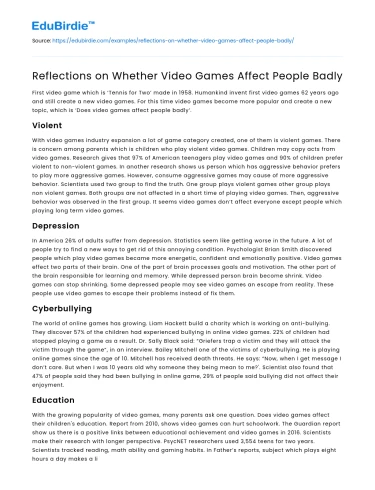Introduction
The proliferation of video games as a dominant form of entertainment in contemporary society has sparked considerable debate regarding their potential impact on individuals. While some argue that video games contribute negatively to behavioral and psychological outcomes, others emphasize their benefits, including cognitive enhancement and stress relief. This essay seeks to explore the multifaceted effects of video games on individuals, drawing upon empirical research and theoretical perspectives. The objective is to provide a balanced examination of the potential adverse effects while acknowledging the counterarguments that challenge these assertions. By evaluating specific examples, real-life cases, and credible sources, this discourse aims to elucidate whether the negative aspects of video games significantly outweigh their positive contributions.
Psychological and Behavioral Effects of Video Games
One of the most prevalent concerns associated with video game consumption is its potential to induce aggressive behavior and psychological disturbances. Numerous studies have investigated the correlation between violent video games and aggression, with mixed results. For instance, a study by Anderson and Dill (2000) found that individuals who engage in violent video games exhibit increased aggressive thoughts and behaviors. This finding has been supported by meta-analytic reviews, such as the one conducted by Anderson et al. (2010), which concluded that violent video games are a causal risk factor for increased aggressive cognition, affect, and behavior. Critics, however, argue that these results may be overstated or confounded by pre-existing personality traits or environmental factors.
Save your time!
We can take care of your essay
- Proper editing and formatting
- Free revision, title page, and bibliography
- Flexible prices and money-back guarantee
Moreover, the psychological impacts of video games extend beyond aggression. Concerns have been raised about addiction and the potential for video games to supplant real-life social interactions. The World Health Organization's classification of "gaming disorder" as a mental health condition underscores the seriousness of this issue. According to a study by Gentile et al. (2011), excessive gaming can lead to a decline in social skills and academic performance, supporting the notion that video games can adversely affect personal development. Despite these findings, it is crucial to recognize that not all gaming leads to negative outcomes, and context, such as content type and time spent playing, plays a significant role.
Counterarguments and Positive Aspects of Video Games
While the negative implications of video games have been well-documented, it is essential to consider the counterarguments that highlight their potential benefits. Video games have been credited with enhancing cognitive abilities, such as problem-solving skills, spatial awareness, and multitasking capabilities. For example, a study by Green and Bavelier (2003) demonstrated that action video game players exhibited superior visual attention and cognitive flexibility compared to non-players. This suggests that video games can serve as valuable tools for cognitive development, challenging the notion that their impact is predominantly detrimental.
Furthermore, video games have been used therapeutically, providing psychological benefits such as stress relief and emotional regulation. The immersive nature of video games allows players to escape reality temporarily, offering a form of relaxation and mental rejuvenation. A study by Russoniello et al. (2009) indicated that casual video game play can reduce stress and improve mood, highlighting their potential as a therapeutic intervention. Moreover, online gaming communities can foster social connections and collaboration, countering the argument that video games hinder social interactions. These positive aspects of video gaming demonstrate the complexity of their impact, suggesting that potential benefits should not be overlooked.
Real-Life Cases and the Role of Context
To further understand the impact of video games, examining real-life cases offers valuable insights into how context influences outcomes. The case of Norway's National Championship for Counter-Strike, a popular first-person shooter game, illustrates how structured gaming environments can promote teamwork, strategy, and communication skills among players, contradicting the stereotype of antisocial behavior. Participants often report improved social skills and a sense of community, emphasizing the role of context in shaping gaming experiences.
Additionally, the success of educational video games, such as Minecraft: Education Edition, exemplifies how games can be harnessed for positive educational outcomes. These games provide interactive and engaging learning experiences that captivate students' attention, facilitating knowledge retention and creativity. This highlights the potential for video games to be integrated into educational curricula, further challenging the perception of their negative impact. The varied outcomes observed in real-life cases underscore the importance of considering context, content, and individual differences when evaluating the effects of video games.
Conclusion
In conclusion, the impact of video games on individuals is a complex and multifaceted issue that cannot be reduced to a simple dichotomy of positive versus negative effects. While there is evidence to suggest that video games can contribute to aggression, addiction, and social isolation, these outcomes are not universally applicable. Counterarguments emphasize the cognitive, psychological, and social benefits of gaming, underscoring the importance of context in shaping experiences. Real-life cases further illustrate that the effects of video games are contingent upon various factors, including content and individual predispositions. Ultimately, a nuanced understanding of video games' impact is crucial, advocating for a balanced perspective that recognizes both their potential risks and benefits.






 Stuck on your essay?
Stuck on your essay?

